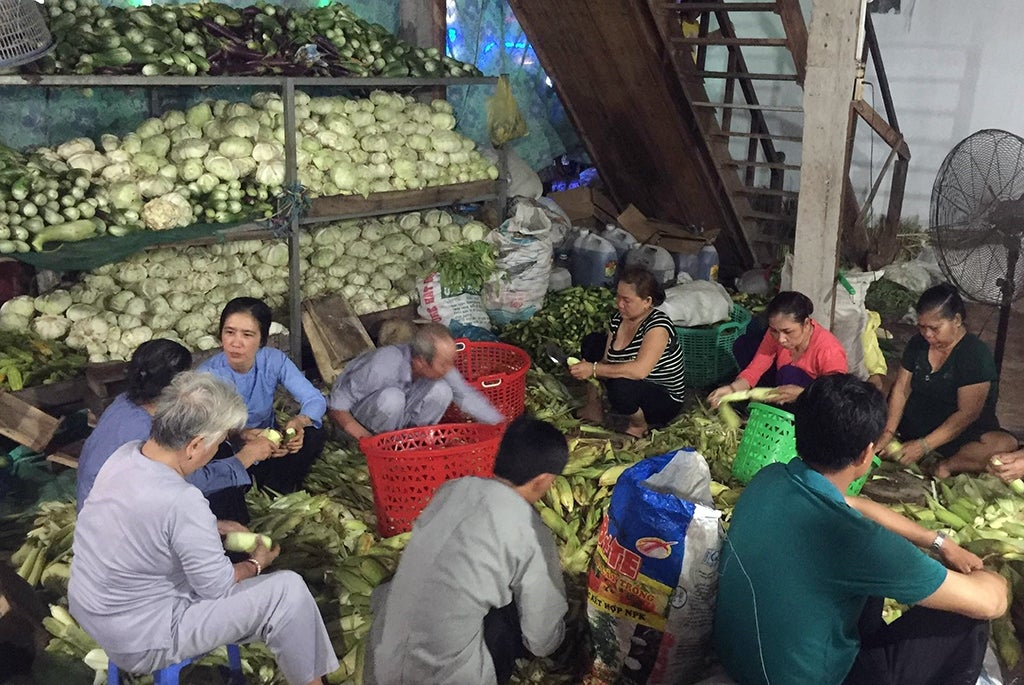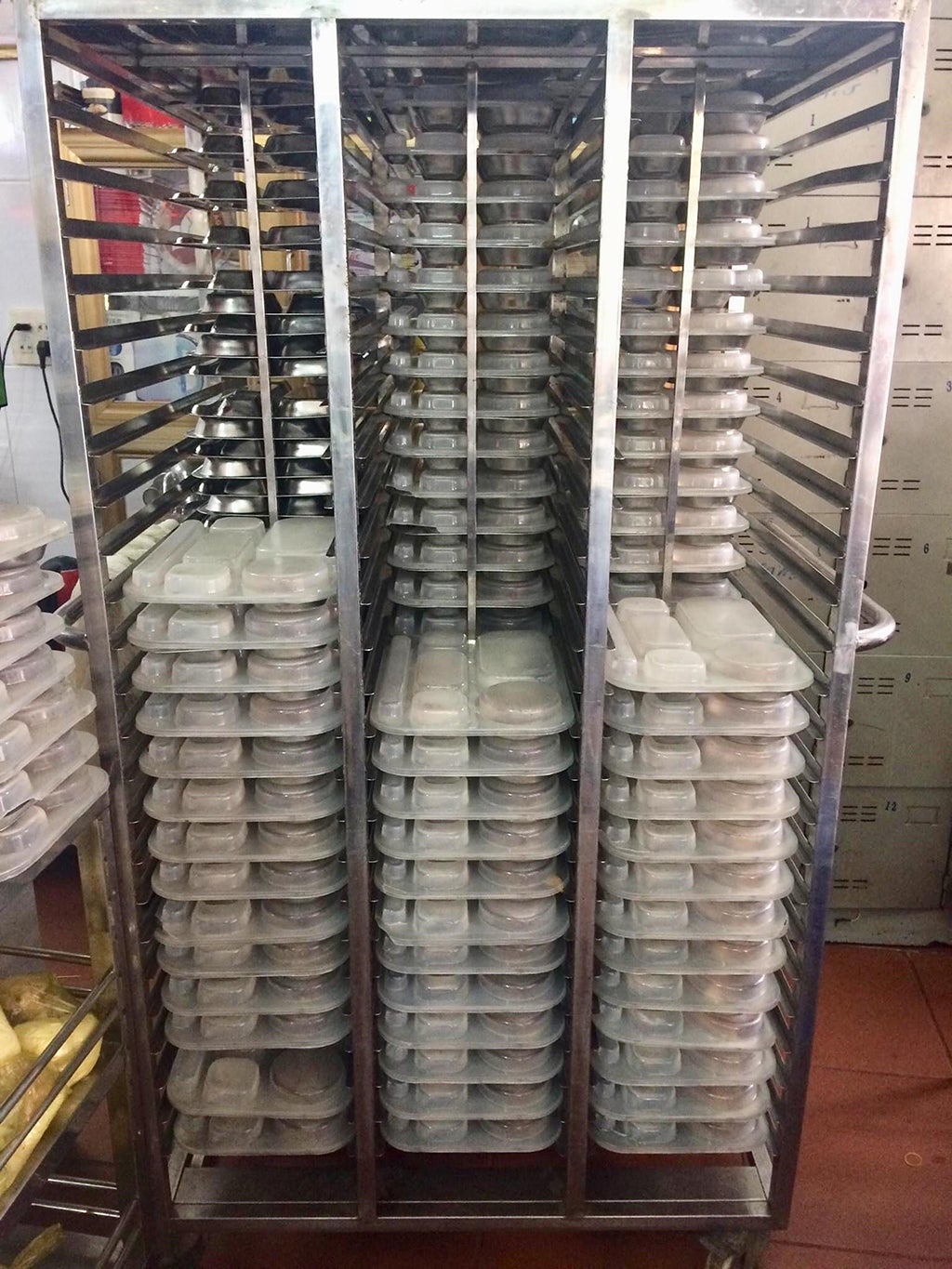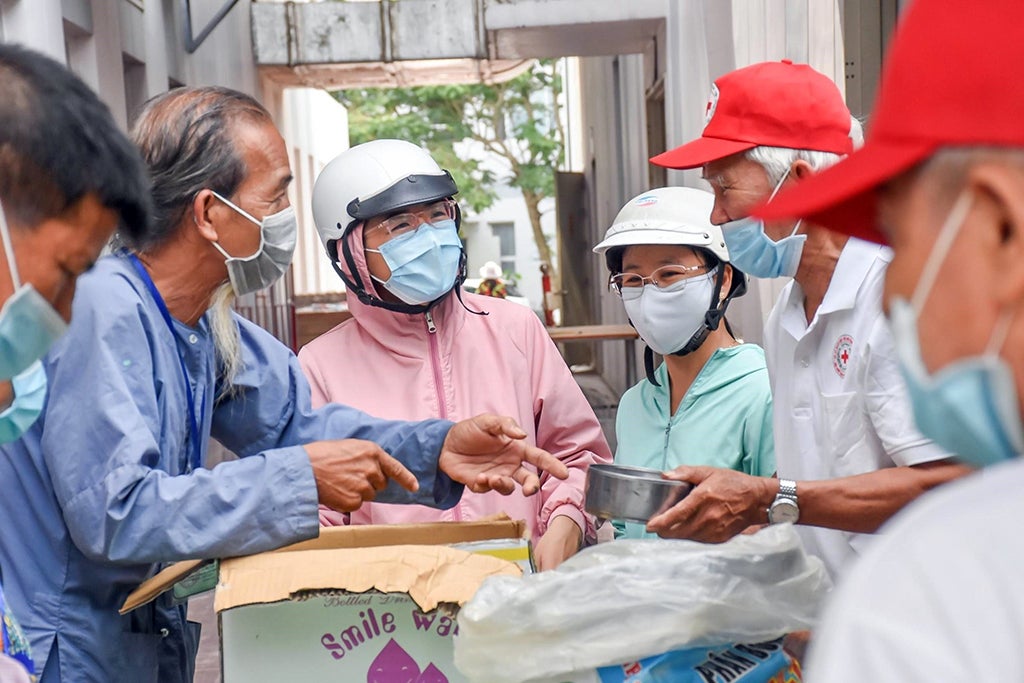The Coronavirus Pandemic and the Response of Hoa Hao Buddhists in the Vietnam’s Mekong Delta
contributed by Vo Duy Thanh, 22 April 2021
The COVID-19 pandemic has affected many people in the Vietnamese Mekong Delta as strict border control measures, especially restrictions placed on the Vietnam-China trade since the second outbreak of the disease in July 2020, have put many agricultural processing factories at risk - resulting in many local enterprises and small businesses to face difficult economic times.
The nationwide social distancing and isolation have caused thousands of people in this region to be temporarily unemployed and without an alternative source of income. Although the central government has introduced several stimulus packages to help the most affected people, many others living on the margin, especially the urban poor, have not received adequate support.

Figure. 1. Key members of a charitable rice kitchen providing foods to needy patients in An Giang Central Hospital, 25th March 2021 (photo by the author)
Hoa Hao Buddhists have identified the urban gap and responded to this need for social welfare by upgrading many existing charitable rice kitchens on an industrial scale so that they can now feed thousands of impoverished people amidst the COVID-19 crisis. In these charitable rice kitchens, one can easily find all sorts of disadvantaged people, including unemployed factory workers, street vendors, river porters, motorbike taxi drivers, lottery ticket selling boys, and impoverished students, just to name a few. Majority of these people migrated from rural areas to make a living in this central city.
This article draws on my personal observations and interviews with key informants in several Hoa Hao Buddhist charitable rice kitchens in Long Xuyen, one of the biggest cities in the Mekong Delta. Hoa Hao is a millenarian Buddhist sect that emerged in the Mekong Delta of Vietnam in 1939. Hoa Hao Buddhists, with an estimation of 4-5 million followers, undertake charity in keeping with a prophetic injunction to repay existential debts to society and humankind, be meritorious and thus save their world from the apocalypse. Aids to the needy and less fortunate are favoured over lavish temple construction, expensive religious rituals or costly food offerings to the gods. Currently, there are five to six charitable rice kitchens operating around Long Xuyen City to feed thousands of needy people per day during the COVID-19 pandemic.
Modernizing kitchen’s facilities for large-scale feeding during the coronavirus crisis
One of the most important factors that influenced the success of charitable rice kitchens during the pandemic was that Hoa Hao Buddhists have modernized the rice kitchens’ infrastructure to increase the charitable food supply for a great number of diners.
As I observed in a charitable rice kitchen nearby Long Xuyen central market, during the COVID-19 crisis, there were more people coming than before, and expectant diners stood in a long queue in front of the rice kitchen. The kitchen manager told me that this charitable rice kitchen was established in 2012 and aimed to provide free food for the street vendors and poor river porters around the marketplace.

Figure. 2. Hoa Hao Buddhists feeding the needy in Long Xuyen City during the COVID-19 pandemic, 25th March 2021
However, since the pandemic conditions in 2020, he soon realised that many other people around the marketplace, whose livelihoods relied on a very marginal income, also needed charitable food. The need for such assistance was increasing, partly as a result of the rising number of people who lost their jobs or encountered financial problems during the pandemic. Hence, the kitchen manager decided to upgrade the scale of kitchen services, increasing the number of feeding to 1200 meals a day.
In order to do so, key members of the kitchen have sought to improve the effectiveness and efficiency of food giving by modernizing and re-designing the kitchen’s infrastructure and facilities, together with its human resource, to provide free food for the urban needy on a larger scale. For instance, the steam rice cooker that previously used wood and charcoal was swapped for an electric rice cooker that could steam up to 100 kilograms of white rice at a time, enough to feed about 500 people for each cook. The new cooking equipment also helped to alleviate burden on labour by making cooking more convenient and less tiresome for kitchen volunteers.
The small refrigerators were also replaced with large ones that could store more vegetables and keep perishables in a good condition. Likewise, other necessary pieces of modern equipment for cooking activities such as electricity pots and pans, storage cupboards, bins for vegetables, and stainless-steel food trays substituted the old kitchen gadgets to improve the kitchen services.
Rationally organizing the kitchen’s human resource to increase feeding productivity
The most intriguing thing about the urban charitable kitchens organized by Hoa Hao Buddhists is that they managed its food supply activities very quickly and timely to adapt to the industrial working styles of urban people on a large scale. Kitchen staff will start cooking in the early morning so that hot meals are ready for service from 10:00am to 13:00pm every day.
Each voluntary group is registered to work in the charitable kitchen on a one-week rotating basis. At the end of the week, each group will move to cook in another charitable rice kitchen or go home to rest, and another group will replace them. Each group comprises about 10 to 15 members, with most being retired teachers and traders, elderly businessmen or farmers who commit significant amounts of their time and labour to the cause on a daily basis.

Figure. 3. Kitchen staff sorting fresh vegetables donated from local traders, 15th August 2020
To increase the productivity and serve a large number of diners during the COVID-19 pandemic, Hoa Hao Buddhists have organised the kitchen’s human resource structure to parallel a commercial enterprise. Kitchen labourers in each group were separated by specialized tasks. Volunteers were assigned different components in order to increase overall efficiency. Generally, there were four types of daily activities that made up the kitchen work: (1) collecting and sorting vegetables and other cooking materials; (2) preparing, cleaning and cooking foods; (3) serving foods; and (4) cleaning up.
The male staff were primarily responsible for physically taxing tasks such as collecting, transporting and storing kitchen materials, including rice, vegetables, fruits and cooking oils. They collected the donated vegetables and fruits from local traders who intend to donate surplus products to the charitable kitchen at the end of each trading day.
On the other hand, female volunteers handled cooking activities. Vegetables were peeled and washed in the previous evening to make sure that they were ready for cooking early in the next morning. The manager usually oversaw the task of passing the food trays to the diners. Young volunteers, mostly female students, were responsible for serving food and drinks, while the male students cleaned the dishes and kitchen floor at the end of each day.
This gendered division of labour helped the charitable rice kitchen easily increase the number of feeds to nearly double during the situation of the coronavirus crisis. The human resources were mobilized from voluntary Hoa Hao Buddhists in inner cities and highly populated Hoa Hao Buddhist localities in the Mekong Delta.
Secular compliance with public health standards during the COVID-19 pandemic
In order to serve food for the needy on such a massive scale, Hoa Hao Buddhists were required to follow the state’s hygiene and food safety regulations as well as comply with COVID-19 social distancing rules.
The main chef of the kitchen must regularly attend training courses organized by the Department of Food Safety on how to process, cook and store foods in a proper way. This basic knowledge is then shared amongst the kitchen staff. Their understanding of food hygiene and safety thus helps minimize the chance of food contamination or food poisoning, protecting both the diners and the reputation of Hoa Hao charitable rice kitchens.
After collecting vegetables donated by market traders from the marketplace, all cooking materials were carefully checked before being used.
Based on the available vegetables donated during the day, the chef would design a specific menu for the following days. The usual routine was to cook white rice, combined with one or two savory dishes and one vegetable soup. They often combined different kinds of vegetables to cook the dishes to provide better intake of various nutrients to facilitate physical health.
Furthermore, Hoa Hao Buddhist volunteers are required to participate in various training sessions on the COVID-19 infection’s control measures organised by the Department of Health. While cooking and serving food to the needy in the kitchen, volunteers must adopt infection prevention and control strategies, using necessary personal protective equipment (PPE) such as gloves and medical masks provided by the kitchen manager.

Figure. 4. Lunch boxes ready to deliver to those needy unable to visit charitable rice kitchen during the coronavirus pandemic, 21st February 2021
Vegetarian food charity for good karma during the COVID-19 pandemic
All of the meals served by Hoa Hao Buddhist charitable rice kitchens are vegetarian. Not only does the charitable food supply of Hoa Hao Buddhists fulfil the official public health requirements, but also meets Hoa Hao ethical obligations.
Hoa Hao Buddhists embrace a religious ethic of avoiding taking the lives of other sentient beings. A charitable kitchen chef told me that:
Providing charitable food for the impoverished is meaningful to Hoa Hao Buddhists. However, if a massive number of animals are killed to have meat for the needy to consume every day, charitable volunteers might generate new sins and this act might also add new bad karma to the needy diners.

Figure. 5. Hoa Hao Buddhists providing vegetarian foods is also seen as offering hospitality to the immigrant needy to overcome remoteness and inaccessibility to social service provision in urban areas during the coronavirus pandemic, 25th March 2021
Hoa Hao Buddhist philosophy conceptualizes vegetarianism as a way to develop humane compassion, and to respect the life of other sentient beings as one’s own life. Followers of this religion also believe that the poverty of one’s present life is a consequence of the bad karma generated from the past or in past lives, and the present sickness of human individuals (including the coronavirus pandemic) is also connected to karmic consequences.
Hence, providing vegetarian meals for the underprivileged during the COVID-19 pandemic is believed to bring good fortune to the volunteers and charitable donors in the next life. On the other hand, vegetarian food could also help the poor to purify themselves by abstaining from meat, so the needy could be accumulating good karma by consuming vegetarian foods.
Conclusion
As seen above, Hoa Hao Buddhists have identified and responded to the social problems that exist in the contemporary urban context during the coronavirus pandemic. The article shows that the charitable food supply run by Hoa Hao Buddhists is remarkably responsive, precise and effective, while meeting the state’s standards and fulfilling urban needs.
The act of giving food to the urban needy in the context of the COVID-19 crisis confirms that the Hoa Hao Buddhist sect is highly capable, responsive, sensitive and adaptive to the radical transformation of society and context. This suggests that Hoa Hao Buddhism is one of the most socially engaged Buddhist faiths in contemporary Vietnam.
Disclaimer: The views and opinions expressed in this article are those of the authors and do not necessarily reflect the position of the blog editorial team or the Asia Research Institute.
South Asia | Southeast Asia | East Asia | Other Places | Hinduism | Buddhism | Islam | Christianity | Other Religions
Dr. Vo Duy Thanh is a lecturer and researcher in the Research Center for Rural Development, An Giang University, Vietnam. Thanh obtained his Ph.D. in Cultural Anthropology at the Australian National University. He has published several academic journals in cultural anthropology and sustainable development in the Vietnamese Mekong Delta.

